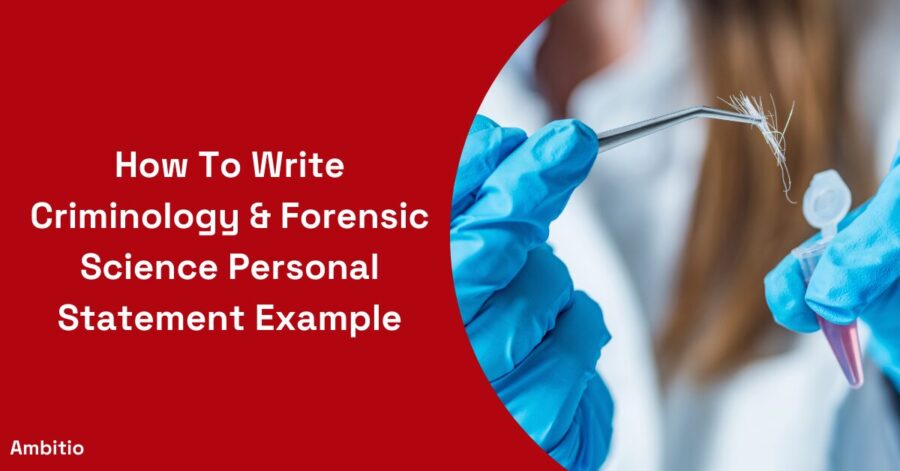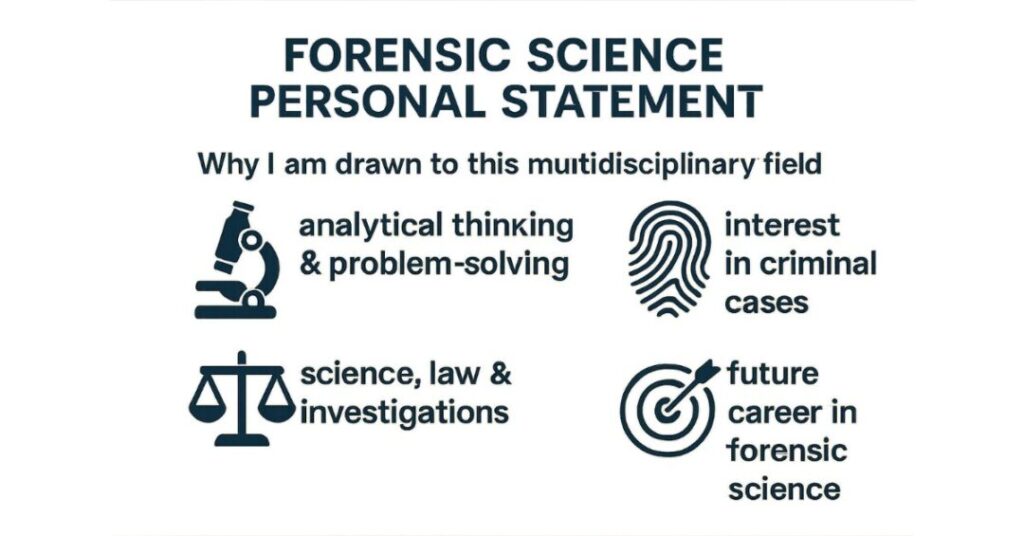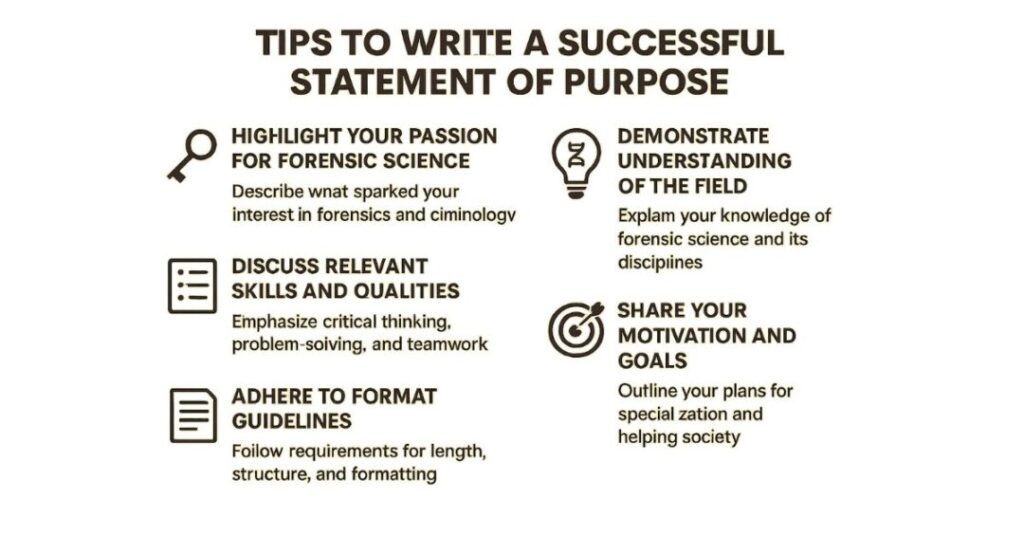24 September 2025
6 minutes read
How To Write Criminology & Forensic Science Personal Statement Example

Key Takeaways
- Forensic science personal statement examples show how passion, skills, and career goals create a strong application.
- Real-world experiences and academic projects help connect science with criminology and human behavior.
- Early preparation and a clear narrative improve your chances of standing out to admissions committees.
Writing an attractive personal statement is crucial when applying for forensic science programs, criminology, or criminal justice programs. It’s your opportunity to showcase your interest in forensics, analytical mindset, and future career aspirations.
Admissions committees seek students passionate about uncovering the complexities of crime scenes, combining disciplines like science, sociology, and anthropology for a unique perspective. An exceptional forensic science personal statement should highlight your problem-solving abilities, critical thinking skills, and a knack for teamwork.
Provide insights into experiences that sparked your fascination with forensics, criminal behaviour, and the intricate puzzles of investigations. Demonstrate your commitment to making a valuable contribution to this challenging yet rewarding field through clear communication skills and a drive to learn.
What Is A Forensic Science Personal Statement?
A forensic science personal statement is a crucial component of your application to undergraduate or graduate programs related to forensics, criminology, or criminal justice studies. This essay allows you to showcase your passion, motivations, relevant experiences, and future goals within the forensic science field.

In a forensic science personal statement, you’ll need to communicate why you are drawn to this multidisciplinary area that combines science, law, and investigations. You can highlight your analytical thinking abilities, problem-solving skills, attention to detail, and interest in complex criminal cases.
Admissions committees will look for your understanding of the role forensic science plays in the criminal justice system and your potential to excel in this demanding yet rewarding career path.
Tips To Write A Successful Statement of Purpose
Writing a winning personal statement is crucial for securing your place in a competitive forensic science, criminology, or criminal justice program. This essay is an opportunity to showcase your unique qualifications, experiences, and perspectives that make you an ideal candidate.

With that said, here are some tips to help you write a successful personal statement:
Highlight Your Passion for Forensic Science
Explain what sparked your interest in forensics and criminology from a young age. Discuss personal experiences, school roles (prefect), internships, or work experiences in the criminal justice system that solidified your passion for this field. Mention documentaries, shows, or books that fueled your fascination with solving puzzles and seeing the bigger picture behind criminal behavior.
Demonstrate Understanding of the Field
Show you are aware that forensic science is a multidisciplinary field combining sciences like toxicology, biology (DNA interpretation), and chemistry (fibre analysis) with criminology and psychology. Discuss how you aim to deepen your knowledge through practical experiences and an analytical mind suited for discovery and courtroom responsibilities.
Discuss Relevant Skills and Qualities
Emphasise skills like critical thinking, problem-solving, communication, teamwork, and attention to detail that will make you an ideal candidate. Provide examples of how extracurriculars, academic projects, or interests like puzzles allowed you to develop and apply these qualities, preparing you for this challenging career.
Share Your Motivation and Goals
Convey your desire to pursue a master’s and specialise in a specific forensic domain like criminal psychology or digital forensics. Explain how this qualification will provide a solid foundation for an impactful career helping the criminal justice system and society by interpreting evidence and understanding human behaviour and mental health issues.
Adhere to Format Guidelines
Research the program’s requirements and follow length, structure, and formatting specifications. Revise for clarity, flow, and impactful storytelling that convinces admissions you are a highly motivated applicant well-suited for their forensic studies.
3 Forensic Science Studies Personal Statement Samples
Sample 1:
You know that curiosity that grips you from a young age about what makes people tick? That indescribable urge to get to the root of things? Well, that’s exactly what led me down this path towards forensic science. From the moment I thumbed through my first forensics book, I was hooked by the incredible integration of science and human behaviour.
My academic career has been a quest to deepen my understanding of these interconnected disciplines. Whether studying toxicology, analyzing DNA processes, or delving into criminology theory, each learning experience has been another piece of the puzzle. But it’s not just about knowledge – I’ve also prioritized hands-on training through internships and volunteering with law enforcement. There’s nothing quite like the thrill of applying forensic techniques in the real world.
In the correctional facility where I interned, I had the privilege of working alongside devoted forensic professionals. Their impacts – from untangling mental health factors to providing courtroom testimony – were inspirational. With my problem-solving mindset, stellar teamwork abilities, and commitment to ethics, I know I have the potential to be that game-changing forensic scientist making a profound difference.
Sample 2:
Let me take you back to when I was a kid, utterly transfixed watching forensic experts on TV meticulously comb through crime scenes. I’d imagine myself there, piecing together the forensic evidence to crack the case. That same exhilaration has driven my academic path and pursuit of practical forensic experiences.
My psychology electives highlighted how crucial forensic specialists are in understanding criminal motivations and rehabilitating offenders. Simultaneously, chemistry and biology fueled my passion for evidence analysis through toxicology, DNA, and more. From documenting deteriorating crime scene samples to studying interrogation techniques, each project and internship deepened my respect for this fascinating convergence of science and human behaviour.
What truly sets me apart is my innate ability to approach complex problems from multiple angles. I thrive on collaborating with teammates, proposing creative solutions, and persevering until the puzzle is solved. My determination to specialize in forensic psychology stems from this drive to not only interpret evidence but also elucidate the human narratives propelling crimes.
Sample 3:
They say to follow your obsessions and let them become your calling. Well, my calling has been forensic science for as long as I can remember. The intricacies of uncovering criminal cases through detailed evidence analysis? I’m utterly fascinated by the process.
On my academic journey, I’ve built a sturdy foundation through rigorous coursework and lab training. Analyzing fingerprints, interpreting DNA sequences, reconstructing crime scene timelines – each module amplified my zeal for this multifaceted field. But it’s the human element underlying forensics that truly captivates me. To better understand criminal psychology and motivations, I purposely undertook electives in sociology and human behavior.
My enthusiasm extends far beyond the classroom too. By actively participating in forensics clubs, developmental workshops, and internships, I’ve gained invaluable real-world experience working with law enforcement. Collaborating alongside seasoned professionals sharpened my teamwork abilities, communication skills, and appreciation for diverse perspectives in forensic investigation.
So as I approach the next phase of this journey, I’m fueled by determination to excel. With my work ethic, a keen eye for detail, and natural problem-solving talents, I have all the tools to distinguish myself as an impactful forensic scientist making groundbreaking discoveries.
Conclusion
At the end of the day, a personal statement for criminology or forensic science programs is about more than just academics; it’s about painting a vivid picture of who you are as an individual. This is your chance to step out from behind the transcripts and test scores and let your authentic voice shine through.
So don’t be afraid to get personal. Share the experiences that sparked your fascination with the mysteries behind criminal behaviour. Discuss the challenges you’ve overcome or the “aha” moments that solidified your path. By infusing your statement with genuine passion and personality, you’ll forge a memorable connection with admissions committees.
Transform your academic aspirations into reality with Ambitio Elite. Immerse yourself in personalized guidance, AI Copilot support, and expert mentorship. Commence your journey today! Explore Ambitio Elite
FAQs
What is the purpose of a criminology and forensic science personal statement?
A criminology and forensic science personal statement is a document that accompanies your university application. Its purpose is to showcase your motivation, interests, and qualifications for pursuing a degree in criminology and forensic science. It should highlight your strengths, experiences, and goals, demonstrating why you are a strong candidate for the program.
How do I start writing my criminology and forensic science personal statement?
Begin by brainstorming your ideas, interests, and experiences related to criminology and forensic science. Reflect on what sparked your interest in the field, any relevant coursework or projects you’ve undertaken, and your career aspirations. Create an outline to organize your thoughts, and then start writing your statement. Make sure to tailor your statement to the specific program you are applying to.
What should I include in my criminology and forensic science personal statement?
Your personal statement should cover your motivation for studying criminology and forensic science, your relevant academic background and skills, any relevant work or volunteer experience, and your career goals. You should also highlight your personal qualities, such as teamwork and communication skills, and demonstrate your knowledge of the field.
How long should my criminology and forensic science personal statement be?
The length of your personal statement will depend on the specific requirements of the university or program you are applying to. Typically, it should be around one to two pages in length, with a clear and concise writing style. Make sure to check the application guidelines for specific word count or page length requirements.
How can I make my criminology and forensic science personal statement stand out?
To make your personal statement stand out, focus on showcasing your unique experiences, skills, and perspectives. Use specific examples to illustrate your points, and demonstrate your passion for the field. Avoid clichés and generic statements, and instead, focus on what sets you apart from other applicants.
How do I edit and proofread my criminology and forensic science personal statement?
Once you have written your personal statement, edit and proofread it carefully to ensure it is error-free and effective. Ask teachers, mentors, or peers to review your statement and provide feedback. Make sure to check for grammar, spelling, and punctuation errors, as well as clarity and coherence.

You can study at top universities worldwide!
Get expert tips and tricks to get into top universities with a free expert session.
Book Your Free 30-Minute Session Now! Book a call now




























